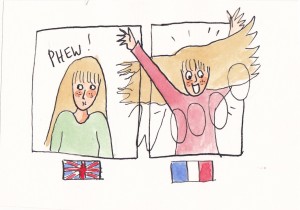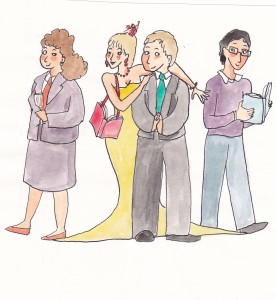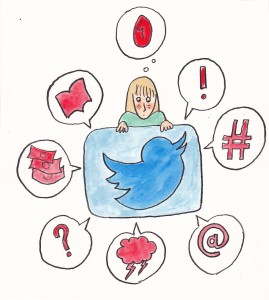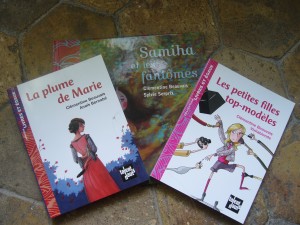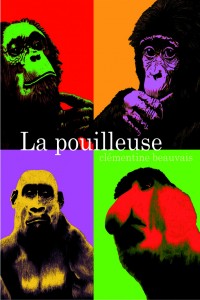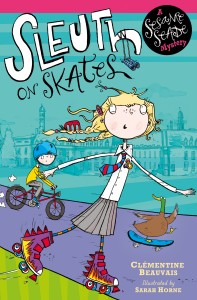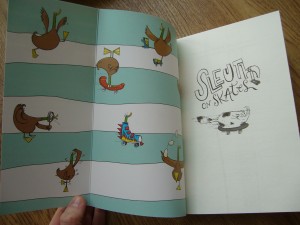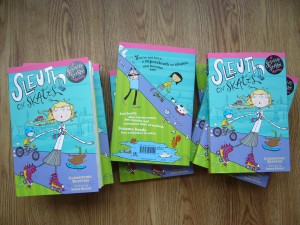[Originally published on An Awfully Big Blog Adventure, November 2015; original post has interesting comments.]
On November 14th, at the IBBY UK conference which took place at Roehampton University (see reports there), Nicky Singer gave a fantastic, passionate, moving talk about her struggle to get a ‘quiet book’, as she called it, published in the UK – a struggle which eventually led her to crowdfund her work, which worked beyond all expectations, ending up with Island, a novel with a cover designed by Chris Riddell.
Lest you should think that this was a fairy-taleish sort of talk, Nicky sternly reminded the audience at the end: “Crowdfunding is not a long-term solution. It worked this time but I won’t be able to do it each time I want to publish a not-easily-marketable book. And it ate up nine months of my life. Nine months when I had to teach myself how to raise money, promote the book, reach out to people. I don’t want to spend nine months of my life doing that; I’m a writer – if I don’t write, I die.”
She could barely finish her sentence as she was choking back tears – and then she actually started crying. Her emotion was extremely contagious, and I don’t think I was the only one in the audience who welled up. It was extremely poignant, and indeed it should be extremely poignant, to hear about an enthusiastic, sensitive, committed writer having so much difficulty getting a good book out. The kind of book that many children will cherish and reread: the kind of book that was written with passion and talent. But the kind that isn’t franchisable, and would not have sold in the tens of thousands.
The kind of book we’re constantly told by the publishing industry is funded by the big bestsellers. You’ve heard this as much as I have. “We need the big bestsellers because they fund the quiet books”. Thanks be to the big bestsellers! Glory be to thee, benevolent worldwide franchise! It’s thanks to them that they exist, those authors whose books do not sell in the hundreds of thousands. They are constantly reminded that they’re indebted to those big franchises.
But where are all these quiet/ politically committed/ socially aware/ aesthetically daring books that we are told get funded so generously by the big bestsellers? sure, there ARE some, but I’m not the only one who doesn’t think there’s enough of them. Julia Eccleshare, in an equally passionate talk at the International Research Society for Children’s Literature conference in August, denounced the sameyness, indeed the copycattiness of much of children’s literature production in the UK, and deplored the domination of a tiny number of authors, genres and types of books. And every single author I’ve talked to about this has had a similar experience: a manuscript or proposal rejected because it was too quiet, or too niche, or too different. Why is it so difficult for Nicky, in a world of publishing bountifully funded by bestsellers, to publish her book with a traditional publisher?
David Maybury, in his talk that same day, gave us a few clues: no book will be a bestseller if you don’t invest at least £30,000 in its promotion. These days, he added (I think it was him, but I may be wrong), you can more or less buy your way into bestseller lists. And we authors all know, though we don’t mention it very often in public, that publishers split books into two groups: those that will become bestsellers, and those that won’t. Those that will are the ones for which there is fertile ground: they might be a bit like another recent bestseller, or very intense/ adventurous, or likely to be turned into a film, etc. They’re ‘hot’ books. And they put their money and promotional push where the ‘hot’ book is. Some books, but very few, are surprise bestsellers.
Well, in this context, it’s not exactly shocking that bestsellers should ‘fund’ the quiet books. It’s only fair, seeing as they’d had a head start the whole time. No?
But perhaps that’s not the right way to look at it. Perhaps those ‘hot’ books are just more funded and more pushed because that’s what a majority of people want, so that’s what brings in money. And UK/US publishers are very relaxed with the idea that publishing is mostly about the money. That’s another oft-repeated mantra of publishing: ‘Publishing isn’t a charity’. We hear this over and over again. So quiet books which don’t make money shouldn’t actually expect to be funded, even by bestsellers. This is a business. Why would we make books that we know will not sell?
Because we will have made them. I think we really, really need to adopt a different attitude to failure and success. A quiet book, a politically committed book, a book about a slice of society or a theme that doesn’t appeal to everyone, succeeds by the very fact of its existence. We need to be much more open to the possibility that a book might sell less than a thousand copies and still be a success, because that book exists.
This isn’t just wishy-washy let-everyone-have-their-chance hippie dreaming. It’s not like this initial openness to ‘failure’ would mean never making back that first investment. Because a thousand quiet books that sell a thousand copies each will be ten thousand quiet books spreading their quiet ideas and quiet tone, which gets readers, and, perhaps more importantly, the publishing industry itself, used to the idea that such books are not pointless luxuries or a waste of money, but an important slice of the market.
No one’s asking publishing to be non-profit, but it’s not true that it’s simply enslaved to the market and condemned to producing ‘what sells’. It can create its own readerly niches. It can foreground its values. It can pave the way for difference. Children’s publishing needs to stop hiding behind the claim that it’s ‘not a charity’. It needs to accept the fact that it has social and a literary responsibility beyond money-making.
At the peak of the refugee ‘crisis’, for want of a better word, Fred Lavabre at Sarbacane, my French children’s publisher, issued a rallying cry to the whole of children’s publishing in France. Being children’s publishers, ‘We have a social responsibility’, he said, ‘to talk about this to children’. This launched a never-before-seen collaboration of 57 publishers (!), who published in just two months a picturebook promoting empathy, respect and welcome for refugees, Eux, c’est nous (They are us), written by Daniel Pennac and illustrated by Serge Bloch (two major figures in children’s literature), with a lexicon by Jessie Magana and Carole Saturno. All proceeds to a refugee charity.
They were going to print 70,000 copies, they had to print 100, 000, by popular demand (especially from bookshops).
It’s been top of the children’s bestseller list since it came out.
EDIT: thank you to Pippa Goodhart for drawing my attention to Nosy Crow’s similar initiative, with Refuge, written by Anne Booth and illustrated by Sam Usher. I should add that my point was not necessarily that everything’s better in France, but that it is possible to act in a way that reflects one’s awareness of the social responsibility of being a children’s publisher. I’m not surprised Nosy Crow did this, by the way. Amazing.






